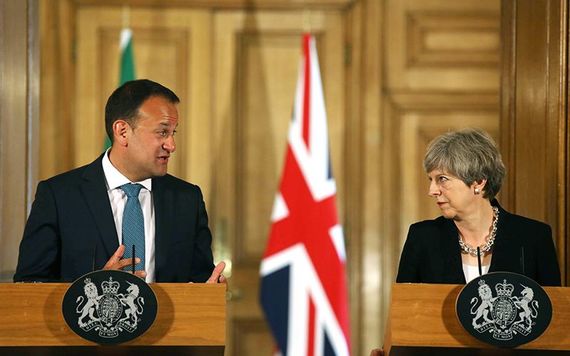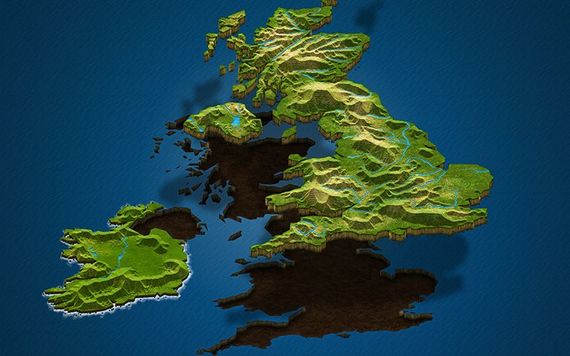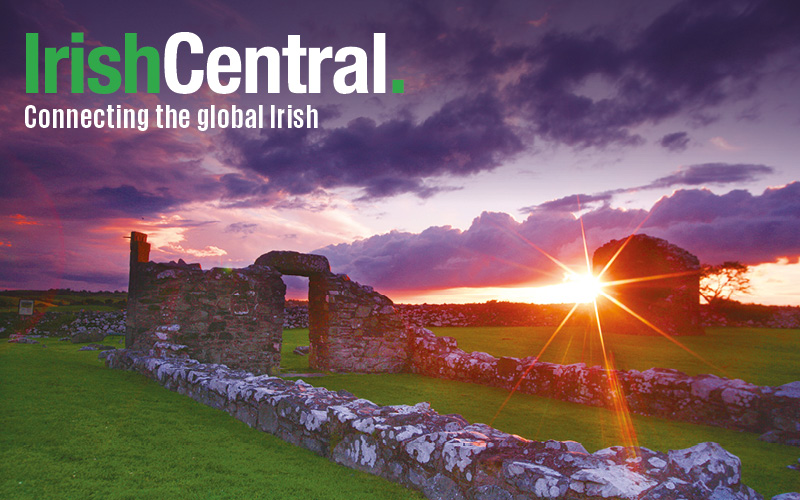Ireland has some big decisions to make over negotiations with the UK and Europe over the Northern Irish border but will they regret getting their own way?
We all know the phrase "you're too clever for your own good." It's what your mother used to say when she wanted to take you down a peg or two.
Unfortunately, it seems that Taoiseach Leo Varadkar's mom did not say it to him often enough because he is being too clever by half on the whole Brexit business -- and it could cost Ireland dearly in the future.
Read more: How a "no-deal" Brexit is going to lead to Irish unification
For months now Varadkar has been doubling down on the Irish position that no matter what happens in the future there can be no border of any kind in Ireland. No hard border, no soft border, no random checks, no customs officials, no cameras -- no anything, as one government official put it recently.

Taoiseach Leo Varadkar and Britain's Prime Minister Theresa May.
That has been the Irish position since the U.K. referendum in 2016 in which the British decided to leave the EU. It has had the full backing of the other EU countries ever since. The British government itself, in an agreement signed with the EU a year ago to advance the negotiations, also accepted that there must be no return of the border in Ireland.
But that was then. Since then Brexit has descended into an appalling mess that is tearing Britain apart and posing huge problems for the EU. And the main difficulty is the backstop -- the guarantee that there can be no return of the border in Ireland whatever form Brexit takes or whatever trading agreements are made in the future.
The reality is, however, that the pious declaration that there can never be a border in Ireland again was always wishful thinking. It was made for the best of intentions and was completely laudable in historic terms. But it was never realistic in economic terms.
Read more: What can Donald Trump and Brexit teach Ireland in 2019?
The simple truth, as we have pointed out many times in this column, is that it is impossible to have Britain (including the north of Ireland) outside the EU customs union and single market without there being a border with the south of Ireland (inside the EU).
It is our bad luck that after Brexit the EU frontier will run across Ireland between north and south. There will have to be border checks there, just as there are border checks at all the other frontiers on the periphery of the EU, like between Poland and Ukraine or in dozens of other places.
This could be averted if a free trade deal can be negotiated between the U.K. and the EU which is so comprehensive and complete that it is the equivalent of EU membership. But that would mean the U.K. would be unable to do trade deals with the rest of the world, one of the main reasons for Brexit in the first place.
And from the EU perspective, it is never going to give such a deal to a non-member. As we said here before, it is a conundrum to which there is no solution that does not involve a border in Ireland.
That is the reality, and no matter how many times the taoiseach repeats the mantra of no border in Ireland, it does not change what is real. At this stage, we need to face that reality and try to help the British to find a solution to the mess. Because it's as much in our interest as it is in theirs.
For Varadkar, it's not enough just to smile and stick to the mantra every time he emerges from an EU meeting, because it's not getting either us or the British anywhere. We can take the view that the British made this mess and it's up to them to sort it out.
But tempting though that is, it is short-sighted. We will be the big losers if Britain crashes out of the EU with no trade deal and we should be doing whatever we can now to ensure this does not happen. And that will mean softening our rhetoric on the border and beginning to consider the least objectionable form a border might take.
It suits the EU to back our hard line border stance right now because the problems it is causing the U.K. are a warning to other countries that might be tempted to leave the EU in the future. But we need to be wary of this supposedly unwavering EU support because it could change quickly in the context of a last-minute trade deal.
To be fair to Varadkar and the Irish government, the No Border Under Any Circumstances line is supported by all the parties and the media here because they are all afraid of being seen as unreliable on the historic national aim of reunification. They can bury their heads in the green sand all they like but it's not going to make the problem go away.
It also increases the chances of a no deal hard Brexit with the U.K. crashing out, something that will inevitably mean a hard border in Ireland whether we like it or not.

What lies ahead for UK and Ireland? Hard Brexit?
It's a classic case of being careful what you wish for. With just 14 weeks now left before the U.K. leaves the EU at the end of March, we are all running out of time.
The crucial vote in Westminster on the withdrawal agreement (which includes the Irish backstop) has now been put off until the middle of January as British Prime Minister Theresa May continues to seek clarification from the EU. But it's unlikely to be passed unless there are significant changes to the backstop.
Which means a hard Brexit crash-out has now become a real possibility. That would be a disaster for Ireland, something that many people in the real world of business here are now warning about.
Last week, for example, Niall FitzGerald, the Irish-born former head of Unilever, one of the biggest companies in Europe, said the government needs to show a degree of flexibility on the backstop issue “sooner rather than later.” He warned that its current stance could eventually bring about the “hardest of hard borders” if it is the reason for a crash out.
“What you don’t want is to leave it so late in the day that the rest of the European Union turns around, maybe on March 28 (the day before Britain leaves the EU) and tells Ireland that we are the only impediment to an agreement,” he said. “Some degree of flexibility needs to be introduced into this. It needs to happen sooner rather than later.”
Read more: British politician apologizes to Irish for her party’s Brexit behavior
Such clarity is welcome because there is a lot of wooly thinking here right now about what lies ahead. This includes the notion that if Britain leaves without a deal we can still avoid having a border, that somehow the issue will be fudged or forgotten. Nothing could be further from the truth.
Under WTO rules about favored nations, Britain would need a border if it leaves the EU without a deal. But these rules are not very demanding and it might be possible to avoid the British building a hard border on their side of the line in Ireland. Certainly, there would be no immediate demand for them to do so.
It's a very different story with the EU, however. If the U.K. crashes out of the EU with no deal, then the EU will immediately insist on a border in Ireland to protect its customs union and the single market.
At that stage, it will be a choice for Ireland. If we want to continue to be in the customs union and single market -- which is the basis for our economic growth and attractiveness to all the multinational companies who set up here -- we will have to build a hard border on our side of the line. The EU will insist on this to avoid global products leaking into the EU via mainland Britain and the North.
There is still the possibility that Britain may have a second referendum if we stick with the backstop and as a result the withdrawal agreement fails to be passed in Westminster in a few weeks. That could be seen as a reason for not giving anything away at this stage.
But it's a high-risk strategy. Another vote in the U.K. might not change much.
We can continue to stick to the backstop in the weeks ahead as though it is going to protect us from all harm. The irony in all this is that a blind insistence on the full backstop could end up bringing about the very thing it was designed to prevent. And that would not be clever at all.




Comments